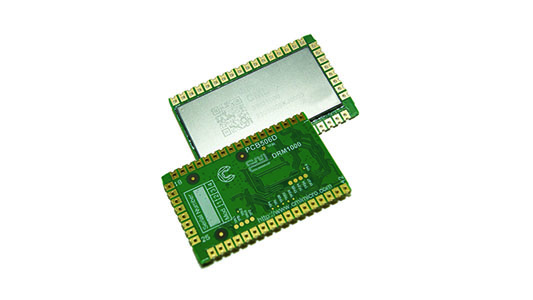Maldon, Essex – CML Micro has announced the global availability of the DRM1000 module – a complete Digital Radio Mondiale (DRM) broadcast receiver implementation that will enable consumer radio manufacturers to connect communities with low-cost, low-power DRM radio designs.
The module is a joint development by CML Micro and Cambridge Consultants, part of Capgemini Invent, combining CML Micro’s world-leading expertise in wireless IC design with Cambridge Consultants’ world-renowned expertise in low-power digital signal processing.
The DRM1000 will be available for purchase through global distributors such as Mouser, DigiKey, RFMW, and other sales outlets. An evaluation and prototyping kit for the DRM1000, the DE9180 is also available now at $199.
“The DRM1000 is the smallest, lowest cost, and lowest power DRM receiver in the market, consuming 80% less power than other commercially available DRM receivers. It is a world-class product that will make DRM capable radios available to all,” says Matthew Phillips, Product Director at CML Micro. “The module will help portable radio suppliers design and build cost-effective DRM radios that are optimised for extended battery life. It will democratise DRM radio for nations rolling out a new digital broadcast network; making it fully accessible with no digital cost/power performance penalty.”
Cambridge Consultants Project Leader Tim Whittaker adds: “This breakthrough in DRM receiver technology has the potential to bring affordable, reliable, and robust radio to an audience of billions around the globe. This innovation is exactly the kind of challenge Cambridge Consultants thrives on. In this instance, it resolves a longstanding stumbling block to the widespread adoption of DRM technology, by providing a cost-effective, low-power solution for manufacturers to connect listeners in low-income, previously unconnected communities to the digital world.”
The availability of the DRM1000 means consumer radio manufacturers can add DRM quickly and easily to their current and future analogue AM/FM/DRM radio receiver designs. By virtue of DRM’s ability to deliver high-quality audio and rich digital content at radio frequencies in the Low, Medium, High, and VHF ranges, DRM is uniquely placed to provide those services to dense urban-area and diffuse rural populations. Listeners can be spread over wide geographical areas yet only require minimal transmitter infrastructure investment. Conversely, DRM’s leading spectral efficiency can also support a much wider variety of content and channels than analogue radio broadcasting when spectrum is congested. This makes DRM the optimum digital radio solution for diverse national deployment.
“Radio manufacturers can now buy the DRM1000 with the DE9180 evaluation and prototyping kit to put the module through its paces before developing a new radio and building their own DRM1000 based design.” says Matthew Phillips. “All the pieces are in place for the cost-effective introduction of DRM capable radios offering excellent end-user performance. The DRM1000 is a complete ‘antenna to audio’ module that can be used for manufacture locally in emerging markets in a standard mass-production electronics facility. This approach supports the principle of local manufacturing in regional markets around the world.”
DRM can seamlessly use existing LF/MF/HF and VHF radio frequency spectrum alongside current analogue services. The standard also provides support for a fully integrated, disaster and early warning service called Emergency Warning Functionality (EWF) that can be used in the event of interruption to communications infrastructure in remote areas caused by natural disasters or other reasons.
The module contains all hardware and software (including all IP and patent licenses) required for radio equipment manufacturers to quickly realise a dual mode (digital and analogue) DRM-capable receiver. There is no need to pay additional software licenses or royalty fees. In addition, the DRM1000 will be pre-certified to the EU Radio Equipment Directive. With dimensions of only 42mm x 25.4mm x 5mm, this compact, low-power receiver solution can be easily integrated into radio equipment in the smallest form factors and is particularly suited to portable, battery, or ‘renewable’ powered devices.
CML Micro will continue to enhance the DRM1000, with short-range wireless connectivity and additional software features during 2024.












